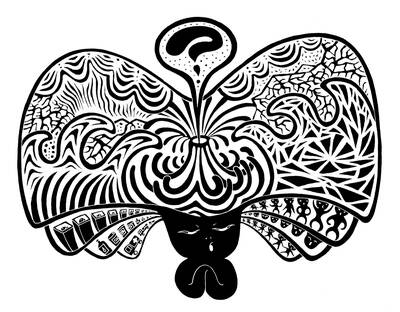Indonesian President Prabowo Subianto recently made a controversial statement that sparked significant public reaction in Indonesia. While attending the Developing Eight (D8) Summit in Egypt on Wednesday last week, Prabowo addressed Indonesian students and suggested he was considering a plan to pardon corrupt officials, provided they return the state funds they embezzled. He claimed this proposal was part of a corruption eradication strategy focused on recovering state assets.
This statement has drawn sharp criticism from civil society groups and anti-corruption activists in Indonesia. They argue that forgiving corrupt officials reflects a flawed understanding on the part of Prabowo and his administration about how to combat corruption. Such a policy, they contend, undermines the anti-corruption initiatives that have been painstakingly developed since the Reformasi era.
Corruption is not merely an administrative breach, but a grave criminal offense — an extraordinary crime — that erodes public trust and weakens the foundation of the rule of law. Within the hierarchy of crimes, corruption is on par with other serious offenses such as terrorism and human trafficking due to its systemic and far-reaching consequences.
Instead of proposing forgiveness for corruption — a move that would clearly harm the sense of justice and erode public confidence in the government — Prabowo should consider learning from Taiwan’s efforts.
Premier Cho Jung-tai (卓榮泰), speaking at the opening of this year’s Asia/Pacific Group on Money Laundering (APG) assessor training workshop in Taipei in October, introduced the “ABC strategy,” which stands for adaptation, blocking and cooperation.
Taiwan has adopted this strategy to advance efforts to prevent money laundering and combat the financing of terrorism, as well as to address corruption and other extraordinary crimes, Cho said.
Adaptation involves adopting policies and regulations that explicitly prohibit corruption, while strengthening law enforcement measures, including whistle-blower protections and the oversight of procurement processes. It also includes adopting advanced technologies, such as e-government systems, blockchain for procurement and secure online reporting mechanisms, to reduce opportunities for corruption. Furthermore, adaptation requires embedding anti-corruption education in schools, universities and workplaces to foster awareness and integrity across society.
Blocking focuses on eliminating opportunities for corruption through robust oversight mechanisms. This entails building effective internal and external audit systems, and engaging independent institutions to monitor budget usage. Blocking also means safeguarding legal processes, official appointments and decisionmaking procedures from political interference.
Cooperation highlights the importance of cross-border collaboration, as corruption often involves international money flows. Therefore, it is crucial to work together with other countries, international organizations and global financial institutions to trace and recover embezzled assets. Cooperation with civil society, the media and academia is equally essential for enhancing monitoring and accountability in anti-corruption policies.
Rather than offering amnesty to corrupt officials, Prabowo should take inspiration from Taiwan’s commitment to eradicating corruption. The Indonesian government would benefit from adopting the “ABC strategy” as part of a comprehensive anti-corruption initiative, with Taiwan serving as a valuable benchmark for best practices.
Najamuddin Khairur Rijal is an associate professor in the International Relations Department of the Faculty of Social and Political Sciences at the University of Muhammadiyah Malang in Indonesia.

Labubu, an elf-like plush toy with pointy ears and nine serrated teeth, has become a global sensation, worn by celebrities including Rihanna and Dua Lipa. These dolls are sold out in stores from Singapore to London; a human-sized version recently fetched a whopping US$150,000 at an auction in Beijing. With all the social media buzz, it is worth asking if we are witnessing the rise of a new-age collectible, or whether Labubu is a mere fad destined to fade. Investors certainly want to know. Pop Mart International Group Ltd, the Chinese manufacturer behind this trendy toy, has rallied 178 percent
My youngest son attends a university in Taipei. Throughout the past two years, whenever I have brought him his luggage or picked him up for the end of a semester or the start of a break, I have stayed at a hotel near his campus. In doing so, I have noticed a strange phenomenon: The hotel’s TV contained an unusual number of Chinese channels, filled with accents that would make a person feel as if they are in China. It is quite exhausting. A few days ago, while staying in the hotel, I found that of the 50 available TV channels,
There is no such thing as a “silicon shield.” This trope has gained traction in the world of Taiwanese news, likely with the best intentions. Anything that breaks the China-controlled narrative that Taiwan is doomed to be conquered is welcome, but after observing its rise in recent months, I now believe that the “silicon shield” is a myth — one that is ultimately working against Taiwan. The basic silicon shield idea is that the world, particularly the US, would rush to defend Taiwan against a Chinese invasion because they do not want Beijing to seize the nation’s vital and unique chip industry. However,

Life as we know it will probably not come to an end in Japan this weekend, but what if it does? That is the question consuming a disaster-prone country ahead of a widely spread prediction of disaster that one comic book suggests would occur tomorrow. The Future I Saw, a manga by Ryo Tatsuki about her purported ability to see the future in dreams, was first published in 1999. It would have faded into obscurity, but for the mention of a tsunami and the cover that read “Major disaster in March 2011.” Years later, when the most powerful earthquake ever